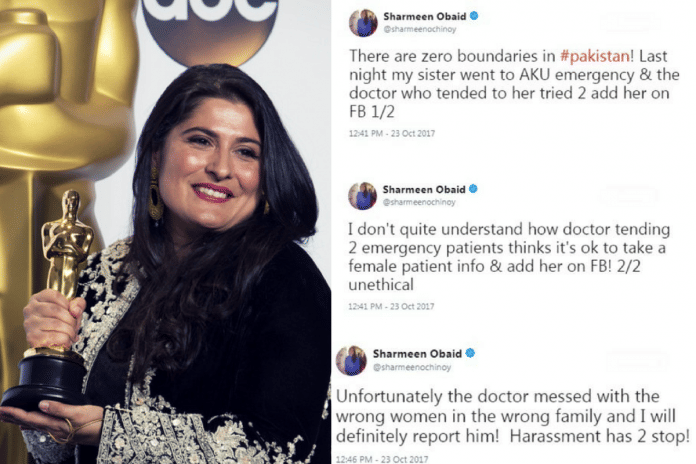While younger generation seeks instant justice and accountability, older feminists seek a long-term solution.
The social media backlash following Pakistani filmmaker Sharmeen Obaid Chinoy’s tweets has fuelled a fresh debate on what constitutes sexual harassment. It also exposes fissures within the feminist thinking in Pakistan.
A doctor at the Aga Khan University Hospital, Karachi, was recently suspended after sending a Facebook friend request to the sister of Chinoy, two-time Oscar winner.
This comes in the wake of the #MeToo campaign triggered by the Harvey Weinstein scandal and lawyer Raya Sarkar’s Facebook post containing the list of her alleged sexual harassers.
Chinoy tweeted about the inappropriateness of the doctor reaching out to her sister on social media on 23 October and said she will “definitely report him” as he “messed with the wrong women in the wrong family”. Her tweets sparked an extreme backlash with many users hurling abuses at her besides calling her traitor, elitist, arrogant, opportunist and drama queen.
She was accused of abusing her class privilege to unnecessarily slander an innocent man. The primary argument against Chinoy’s actions was that sending a Facebook friend request should not be seen as sexual harassment.
For a country seen as the hotbed of terrorism and oppressor of silent burkha-clad women, Pakistan’s feminist struggle rarely finds space in its media. Very little has been written about law such as the Protection Against Harassment of Women at Workplace Act, in 2010, which was a result of a nine-year-long struggle by feminists such as Fouzia Saeed.
Afia Shehrbano, a feminist researcher and activist based in Karachi, calls it a trend of using social media as a platform for “revenge-justice rather than due justice”. “It’s not just about building up momentum; online activism has an attention deficit disorder. These hashtags die out the next day. We need to have an end goal,” she said.
The incident brings to the fore the widening gap between views held by the younger generation and older feminists. While the former seeks immediate justice, freedom of expression and accountability, the latter group holds the view that one must work within a structure in order to change it in the long-term. The end goal is, however, the same – to dismantle patriarchy and make the world a safer, more just and equal place for every person.






